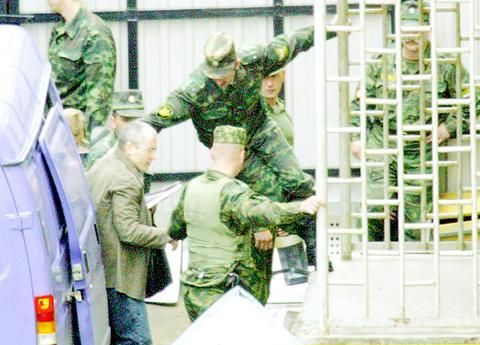Embattled Russian billionaire Mikhail Khodorkovsky, the main owner of oil giant YUKOS, arrived at a court in Moscow yesterday for the opening of his trial on fraud and tax evasion charges.
Khodorkovsky, Russia's richest man, will be tried along with another major shareholder in YUKOS, Platon Lebedev. The trial is seen by many as a government-inspired push to jail Khodorkovsky and strip him of his wealth.
His downfall is said by analysts to be the work of people in the Kremlin who fear he was using his wealth to sway public policy and mount a challenge to their authority.

PHOTO: REUTERS
Khodorkovsky, 40, wearing a brown leather jacket, arrived in a large blue van at a side entrance to the Meschchansky district court in Moscow and was led in by police. Inside the building, he waved to his parents, reporters and lawyers before being led into the courtroom.
The trial, before a panel of three judges, is an important test case for President Vladimir Putin, who has said he wants justice to run its course in the YUKOS affair. He has also warned that tax evasion will not be tolerated and that other captains of industry may face prosecution.
YUKOS shares fell by up to 12 percent on Moscow's Micex stock exchange yesterday after at one point on Tuesday plunging 14 percent to US$6 on the benchmark RTS exchange, its lowest level for more than two years.
Human rights activists accuse Putin of manipulating the judicial process to suit the state's interests. The hearing was part of a two-pronged judicial assault on YUKOS and its owners, which comes to a head this week and could put the company in bankruptcy.
A Moscow court will hear an appeal tomorrow by Russia's tax ministry aimed at forcing YUKOS to pay a US$3.4 billion bill for back taxes immediately.
If the court finds in favour of the tax authorities, as expected, YUKOS says it may go bust because another court has frozen the company's assets, making it impossible for YUKOS to raise enough cash in time to pay the bill.
A member of Khodorkovsky's legal team said he was in little doubt that both men would be convicted and receive jail sentences of up to 10 years.
"They are going to be found guilty," Robert Amsterdam, a Toronto-based lawyer, said.
"It is a show trial to help the government expropriate YUKOS," he said.
Some analysts say that if YUKOS is driven out of business, Khodorkovsky and his associates, who control the oil group through a company called Menatep, will be dispossessed of their prize asset.
Investors appear to be giving up hope of a negotiated settlement with the authorities that could let YUKOS off the hook. "I personally do not see any other scenario apart from bankruptcy," said Stephen Dashevsky, an analyst at Aton brokerage in Moscow.

Philippine President Ferdinand Marcos Jr yesterday vowed that those behind bogus flood control projects would be arrested before Christmas, days after deadly back-to-back typhoons left swathes of the country underwater. Scores of construction firm owners, government officials and lawmakers — including Marcos’ cousin congressman — have been accused of pocketing funds for substandard or so-called “ghost” infrastructure projects. The Philippine Department of Finance has estimated the nation’s economy lost up to 118.5 billion pesos (US$2 billion) since 2023 due to corruption in flood control projects. Criminal cases against most of the people implicated are nearly complete, Marcos told reporters. “We don’t file cases for

A feud has broken out between the top leaders of the far-right Alternative for Germany (AfD) party on whether to maintain close ties with Russia. The AfD leader Alice Weidel this week slammed planned visits to Russia by some party lawmakers, while coleader Tino Chrupalla voiced a defense of Russian President Vladimir Putin. The unusual split comes at a time when mainstream politicians have accused the anti-immigration AfD of acting as stooges for the Kremlin and even spying for Russia. The row has also erupted in a year in which the AfD is flying high, often polling above the record 20 percent it

Ecuadorans are today to vote on whether to allow the return of foreign military bases and the drafting of a new constitution that could give the country’s president more power. Voters are to decide on the presence of foreign military bases, which have been banned on Ecuadoran soil since 2008. A “yes” vote would likely bring the return of the US military to the Manta air base on the Pacific coast — once a hub for US anti-drug operations. Other questions concern ending public funding for political parties, reducing the number of lawmakers and creating an elected body that would

‘ATTACK ON CIVILIZATION’: The culture ministry released drawings of six missing statues representing the Roman goddess of Venus, the tallest of which was 40cm Investigators believe that the theft of several ancient statues dating back to the Roman era from Syria’s national museum was likely the work of an individual, not an organized gang, officials said on Wednesday. The National Museum of Damascus was closed after the heist was discovered early on Monday. The museum had reopened in January as the country recovers from a 14-year civil war and the fall of the 54-year al-Assad dynasty last year. On Wednesday, a security vehicle was parked outside the main gate of the museum in central Damascus while security guards stood nearby. People were not allowed in because